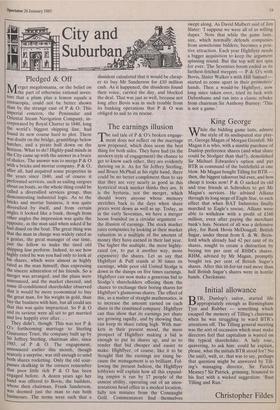The earnings illusion T he sad tale of P & O's
broken engage- ment does not reflect on the marriage now proposed, which does seem the best thing for both sides. They have had (in the modern style of engagement) the chance to get to know each other, they are evidently thriving on it. As for Sir Jeffrey Sterling, and Bruce McPhail at his right hand, there could be no better compliment than to say that they are very nearly as good as this hysterical stock market thinks they are. It is the hysteria, not the merger, which should worry anyone whose memory stretches back to the days when share prices went down as well as up. Today, as in the early Seventies, we have a merger boom founded on a circular argument the illusion of earnings. The stock market rates companies by looking at their market valuation as a multiple of the amount of money they have earned in their last year. The higher the multiple, the more highly- rated (or, to put it another way, more expensive) the shares. Let us say that Highflyer & Puff stands at 30 times its earnings, while poor old United Stodge is down in the dumps on five times earnings. Highflyer can now make a generous bid to , Stodge's shareholders offering them the chance to exchange their boring shares for Highflyer's glamorous shares. The effect of this, as a matter of straight mathematics, is to increase the amount earned on each share in the combined company. Highflyer can thus show that its earnings per share are growing rapidly, and by showing that, can keep its share rating high. With mar- kets in their present mood, the mere prospect of Highflyer making a bid is enough to put its shares up, and so to render that bid cheaper and easier to make. Highflyer, of course, like it to be thought that the earnings are rising be- cause the management is so brilliant. Fol- lowing the present fashion, the Highflyer lobbyists will explain how all this expand- ing empire is run by 17 people of the utmost ability, operating out of an unos- tentatious head office in a modest location, fully ten minutes from the Connaught Grill. Commentators find themselves swept along. As David Malbert said of Jim Slater: 'I suppose we were all of us willing dupes.' Note that while the game lasts, size, which normally defends companies from unwelcome bidders, becomes a posi- tive attraction. Each year Highflyer needs a bigger acquisition to keep the argument spinning round. But the top will not spin for ever. The Seventies boom ended as its farthest-fetched mergers — P & O's with Bovis, Slater Walker's with Hill Samuel started to come apart in their promoters' hands. Then a would-be Highflyer, now long since taken over, tried its luck with Debenhams and ran into a classic rebuke from chairman Sir Anthony Burney: 'This is not a game.'










































 Previous page
Previous page